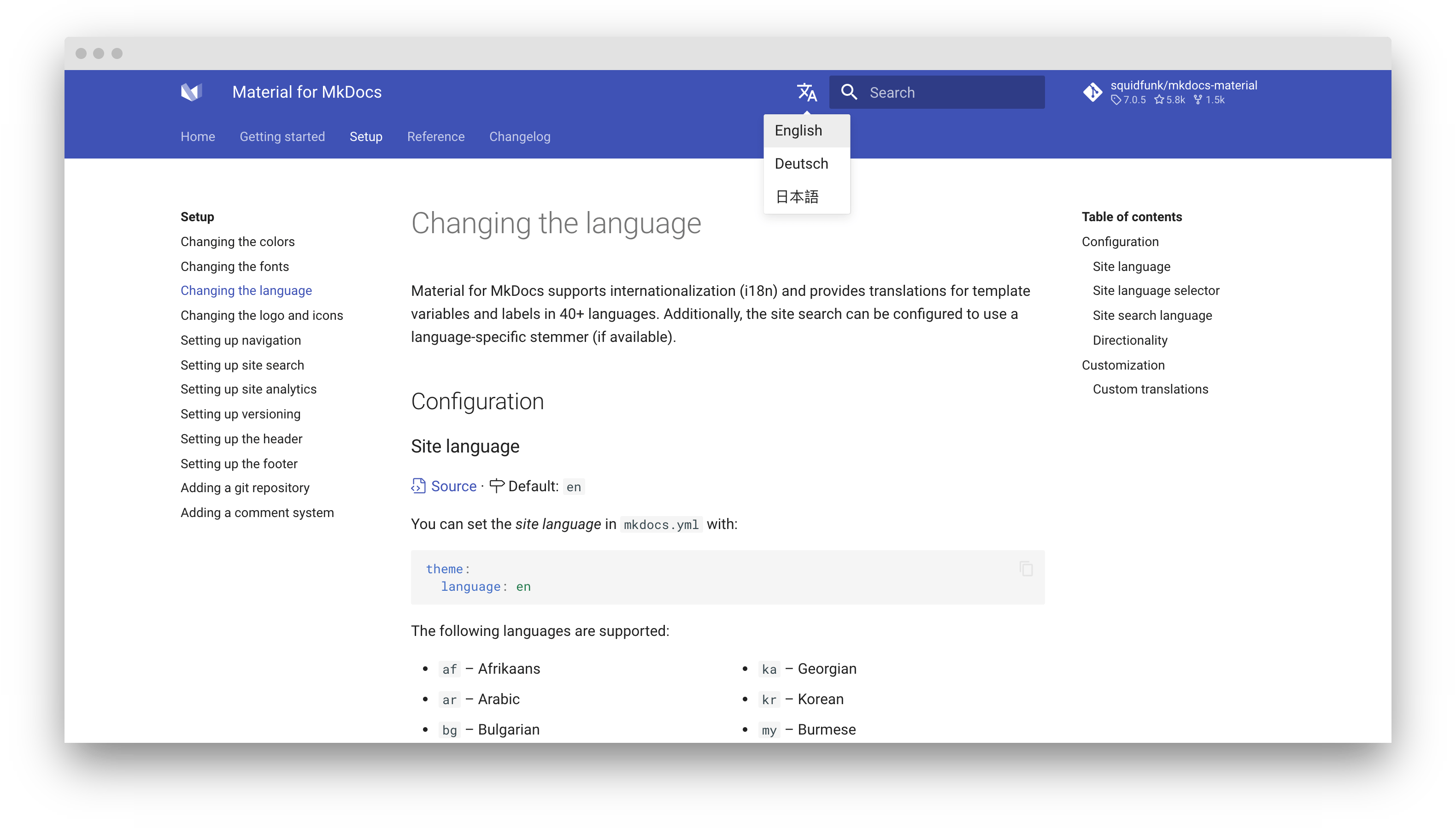6.4 KiB
| template |
|---|
| overrides/main.html |
Changing the language
Material for MkDocs supports internationalization (i18n) and provides translations for template variables and labels in 40+ languages. Additionally, the site search can be configured to use a language-specific stemmer, if available.
Configuration
Site language
:octicons-tag-24: 1.12.0 ·
:octicons-milestone-24: Default: en
You can set the site language in mkdocs.yml with:
theme:
language: en
The following languages are supported:
af– Afrikaansar– Arabicbg– Bulgarianbn– Bengali (Bangla)ca– Catalancs– Czechda– Danishde– Germanel– Greeken– Englisheo– Esperantoes– Spanishet– Estonianfa– Persian (Farsi)fi– Finnishfr– Frenchgl– Galicianhe– Hebrewhi– Hindihr– Croatianhu– Hungarianid– Indonesianis– Icelandicit– Italianja– Japaneseka– Georgiankr– Koreanmn– Mongolianmy– Burmesenl– Dutchnn– Norwegian (Nynorsk)no– Norwegianpl– Polishpt– Portuguesero– Romanianru– Russiansh– Serbo-Croatiansi– Sinhalesesk– Slovaksl– Sloveniansr– Serbiansv– Swedishth– Thaitr– Turkishuk– Ukrainianvi– Vietnamesezh– Chinese (Simplified)zh-Hant– Chinese (Traditional)zh-TW– Chinese (Taiwanese)- Add language
Note that some languages will produce unreadable anchor links due to the way the default slug function works. Consider using a Unicode-aware slug function.
Site language selector
:octicons-tag-24: 7.0.0 · :octicons-milestone-24: Default: none · :octicons-beaker-24: Experimental
If your documentation is available in multiple languages, a language selector
pointing to those languages can be added to the header. Alternate languages
can be defined via mkdocs.yml.
extra:
alternate:
- name: English
link: /en/ # (1)
lang: en
- name: Deutsch
link: /de/
lang: de
- Note that this must be an absolute link. If it includes a domain part, it's
used as defined. Otherwise the domain part of the
site_urlas set inmkdocs.ymlis prepended to the link.
The following properties must be set for each alternate language:
name{ #language-name }-
:octicons-milestone-24: Default: none · :octicons-alert-24: Required – This value of this property is used inside the language selector as the name of the language and must be set to a non-empty string.
link{ #language-link }-
:octicons-milestone-24: Default: none · :octicons-alert-24: Required – This property must be set to an absolute link, which might also point to another domain or subdomain not necessarily generated with MkDocs.
lang{ #language-lang }-
:octicons-milestone-24: Default: none · :octicons-alert-24: Required – This property must contain an ISO 639-1 language code and is used for the
hreflangattribute of the link, improving discoverability via search engines.
Directionality
:octicons-tag-24: 2.5.0 · :octicons-milestone-24: Default: automatically set
While many languages are read ltr (left-to-right), Material for MkDocs also
supports rtl (right-to-left) directionality which is deduced from the
selected language, but can also be set with:
theme:
direction: ltr
Click on a tile to change the directionality:
ltr
rtl
Customization
Custom translations
If you want to customize some of the translations for a language, just follow
the guide on theme extension and create a new partial in the overrides
folder. Then, import the translations of the language as a fallback and only
adjust the ones you want to override:
=== ":octicons-file-code-16: partials/languages/custom.html"
``` html
<!-- Import translations for language and fallback -->
{% import "partials/languages/de.html" as language %}
{% import "partials/languages/en.html" as fallback %} <!-- (1) -->
<!-- Define custom translations -->
{% macro override(key) %}{{ {
"source.file.date.created": "Erstellt am", <!-- (2) -->
"source.file.date.updated": "Aktualisiert am"
}[key] }}{% endmacro %}
<!-- Re-export translations -->
{% macro t(key) %}{{
override(key) or language(key) or fallback.t(key)
}}{% endmacro %}
```
1. Note that `en` must always be used as a fallback language, as it's the
default theme language.
2. Check the [list of available languages], pick the translation you want
to override for your language and add them here.
=== ":octicons-file-code-16: mkdocs.yml"
``` yaml
theme:
language: custom
```
